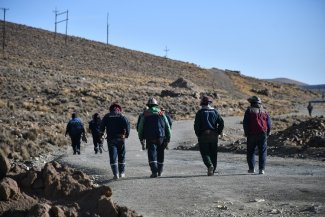
Kanyarucinya. October 2012. In this little village approximately ten kilometres north of Goma and about 17 kilometres from the front line, approximately 60,000 people have found temporary refuge.
This is history repeating itself in dramatic fashion: the majority of these families had already fled their homes in 2008 when the Congress for the Defence of the People (CNDP) a Tutsi militia had threatened to attack Goma, the capital of the North Kivu province.
Following a peace agreement signed with the Kinshasa government, the majority of the members of the CNDP were integrated into the Congolese army in 2009.
It is these same soldiers that mutinied between April and May 2012, leaving the army to set up the new rebel movement, M23.
According to UNHCR, the UN Refugee Agency, approximately 390,000 new internally-displaced people have fled the fighting which has been on-going for six months between the Armed Forces of the Democratic Republic of Congo (FARDC) and the M23 mutineers, following in the footsteps of the families at Kanyarucinya, taking shelter under makeshift shelters offering little protection from the rain in the middle of the rainy season.
A further 60,000 people have taken refuge in Rwanda and Uganda.
In September 2011, I met Angélique Kipulu Katani, gender coordinator and vice president of the Congo Trade Union Confederation (CSC) in Kinshasa.
She explained to me that for almost twenty years (more accurately since the 1994 genocide in Rwanda), the east of Congo has never known peace, only short periods of deceptive calm. And that in areas where there is ongoing conflict between armed men, women are of course the first victims.
“The violence is constantly being repeated. Every time women go to the fields, they are prey to their tormentors.
“Rape is carried out on girls and women of all ages, from babies to women of 80 years old and more.
“It is committed by the many armed groups (Interahamwe, Maï-Maï, etc), present in the East, and by our army. These men go into a village, rape the women, and sometimes kidnap them and take them to the forest as their prisoners.”
Explosive insecurity
In South Kivu, the situation is also very tense. On 31 October, the city of Bukavu staged a protest against the upsurge in killings.
Organised by the civil society bureau, the strike was widely supported despite messages from the authorities asking people not to support it.
Just one week before, on 25 October, the renowned doctor Denis Mukwege narrowly escaped an assassination attempt.
This world-famous obstetrician/gynaecologist at the Panzi Hospital in Bukavu has worked tirelessly for years with women victims of gender-based violence.
In 12 years, he has treated over 30,000 women, suffering with what are often particularly serious genital lesions.
When he talks about his work, the stories are unbearable.
"One day,” he recalls, "the International Committee of the Red Cross brought a young girl aged 18 or 19 to me. She had been raped.
“The barrel of a gun had been placed in her vagina and shot. Her entire urogenital system was in shreds.
“I tried to put the pieces back together as best I could. It took six operations."
Following the attempted assassination of Dr Mukwege, the gynaecologist and his family have taken refuge in Belgium.
The perpetrators of the attack remain at large and the attack remains unexplained.
This is a terrible loss for all the women victims of sexual violence.
Rape: a weapon of war
According to him, rape is clearly being used as a weapon of war in eastern Congo to terrorise the population, deconstruct society and in this way to favour the illegal exploitation of the country’s tremendous riches.
According to Colette Braeckman, a Belgian journalist for Le Soir and Le Monde diplomatique who has written a book on the subject, Dr Mukwege even suspects that rape is part of a plan to depopulate Kivu and to replace the original inhabitants with new ones.
In additions to conflict-related violence, women are also victims of abuse in the work place: sexual harassment, pregnant women being fired, discrimination and inhumane working conditions.
This is without counting domestic violence. According to Jeanine Gabrielle Ngungu, a gender activist and national coordinator of the Common Change DRC programme:
“In the DRC, statistics show that two out of three women suffer on a daily basis. We can end all violence against women. If this country is to really develop, the place of the woman, her role, her dignity, must be recognised."
Stop the violence. Now!
The 25 November is the International Day for the Elimination of Violence Against Women.
Designated as such by the UN General Assembly in 1999, each year it is an opportunity for trade unions, feminist organisations and all those who would like to promote gender equality to mobilise to curb sexual violence.
In the case of Congo, we must firstly as a matter of urgency organise awareness-generating campaigns for the general public.
We must then call upon the international community to exert real pressure on Rwanda and Uganda so that these countries stop supporting the M23 – support which was uncovered by a carefully-researched United Nations report.
Finally, we must call on the government of the DRC to take decisive measures to restore peace in the east of the country, to prosecute the perpetrators of sexual violence and in this way to put an end to impunity. And we must act now!








